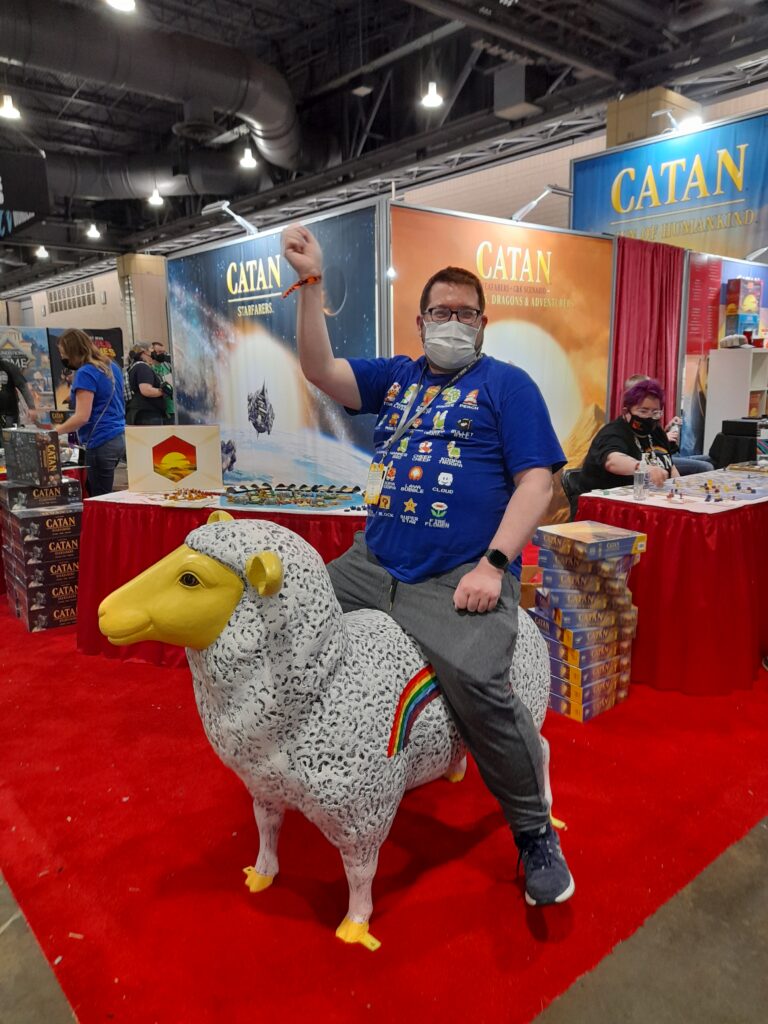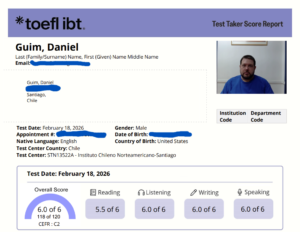I’ve been a fan of the board game Catan for many years now. I remember my host family in Germany introducing me to the game back in 2000, but at that time it didn’t really interest me. Then in about 2012 I learned to play from some friends, and ever since then it has been a wonderful alternative to going out to eat or for drinks.
I have so many fond memories of playing with friends, either in person or online. Being able to play Catan online was a huge help in getting through the pandemic, as I would organize games with friends complete with a Zoom room to be able to talk and see each other’s reactions as we navigated the ups and downs of the game and someone’s eventual victory. It’s also something that I’ve shared with students as a way to practice English in a different context.
What is Catan?
If you’re not familiar with it, Catan is a board game typically for 3 or 4 players (with the option to expand up to 5 or 6) based on settling on an island. There are different types of terrain (pastures, forests, crop fields, mountains, etc) that correspond to different resources (wheat, brick, sheep, ore, and wood). Players create settlements at the intersections of different hexagons, and they receive resources based on the dice rolls. Using those resources, they can then build roads, more settlements, or cities. There are also development cards that help you advance in the game.
The goal of the game is to get to 10 points, and there’s a variety of ways to get there. Settlements and cities give you points, but each of them is limited in number. You can also gain points from victory point cards, building the longest road, and having the largest army. This gives players some flexibility, but it also requires strategy and the ability to adapt when things don’t work out as planned.
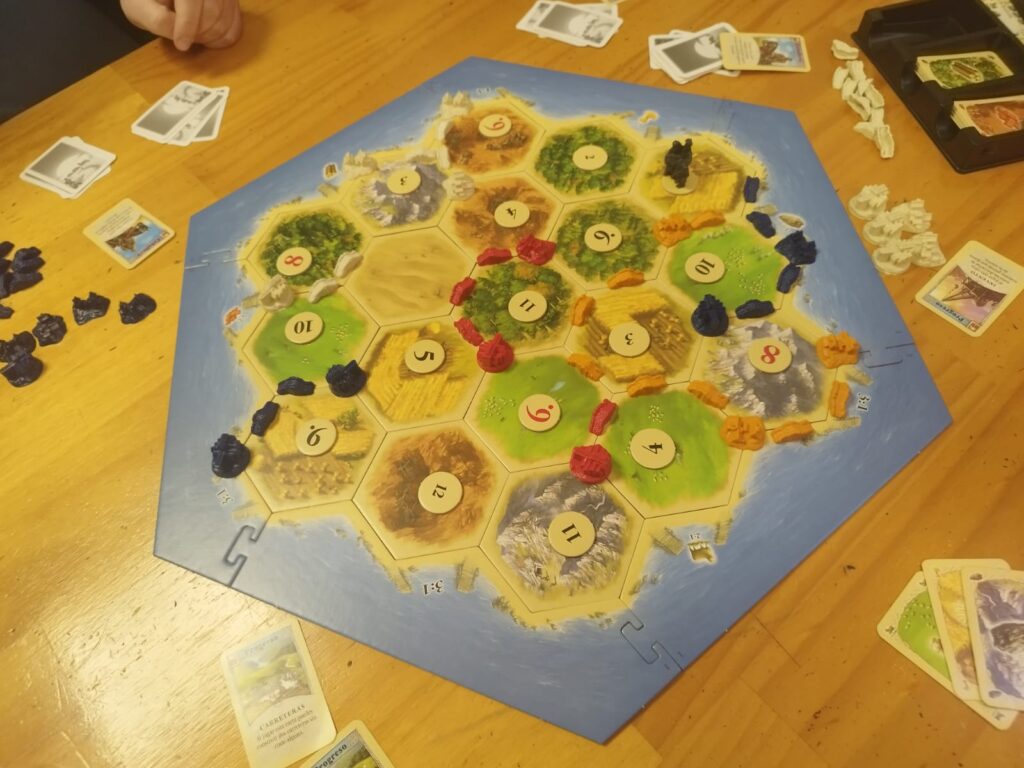
An Opportunity Presents Itself
At one point or another I came across a Catan Instagram account based in Chile, and I started following. I discovered that they conduct tournaments in Santiago. I also joined the WhatsApp group to stay up to date with what’s going on.
In my friend group I’m one of the better players. It got me to thinking if I was good enough to participate in a tournament and actually do somewhat well.
I signed up for a tournament in 2023, but the morning of the tournament self-doubt creeped in and I decided not to go.
I stayed in the WhatsApp group, and this year I decided to give it a try. I went to a tournament last month and one yesterday.
The First Tournament
This tournament was on a Wednesday evening at 6 PM, so after the workday. It ended up starting late since people were dealing with traffic coming directly from work. There were two qualifier games, and then the top 16 moved onto the semifinals.
I was nervous as I checked in and sat down to find my table, but I took some deep breaths to relax. In the first game I made some mistakes, and I ended up in third place with 6 points.
There was actually an intermission between the first two games with some special guests. I didn’t know it before the event, but there is actually a Catan pisco. (For those that don’t know, pisco is a type of alcohol that comes from grapes grown in Chile and Peru.) The founder Catalina decided to name her pisco brand Catan by combining her first name with her husband’s first name (Cata + Dan = Catan). After the business was established, they discovered the game Catan and started working together.
Catalina spoke about the journey that she’s been on with starting her own business, and she came with a group of friends supporting her. She dedicated the bottle of pisco that she gave to the bar to the LGBTQIA+ community and proudly declared her support to the community, which I found very touching, especially in this day and age.

There was also a livestream from Germany with the CEO of Catan. He answered questions from the audience about the game, and he talked about how his father (the creator of the game) actually used him and his siblings as guinea pigs to test out how the game worked. It was really interesting hearing about his experience.
After that, it was time for the second game. It ended with me and another player tied for first at 7 points due to the time limit. I feel like I played as best as I could have, and I was satisfied with the outcome. It was a fun game, and I felt more relaxed than in the first one.
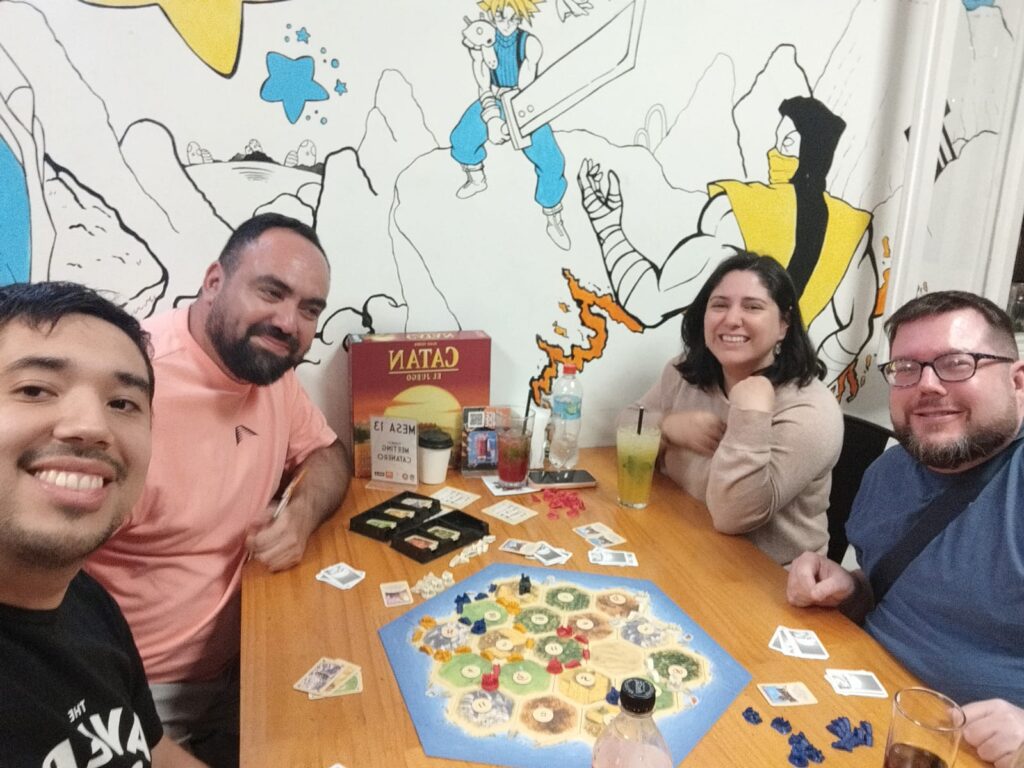
I held my breath as they calculated the results for the top 16, and I didn’t make it. I was ranked 36 out of 80, so in the upper half but not high enough to qualify for the semifinals. The space between one player and another was fairly close, and it felt good to have participated in the tournament and chat with people.
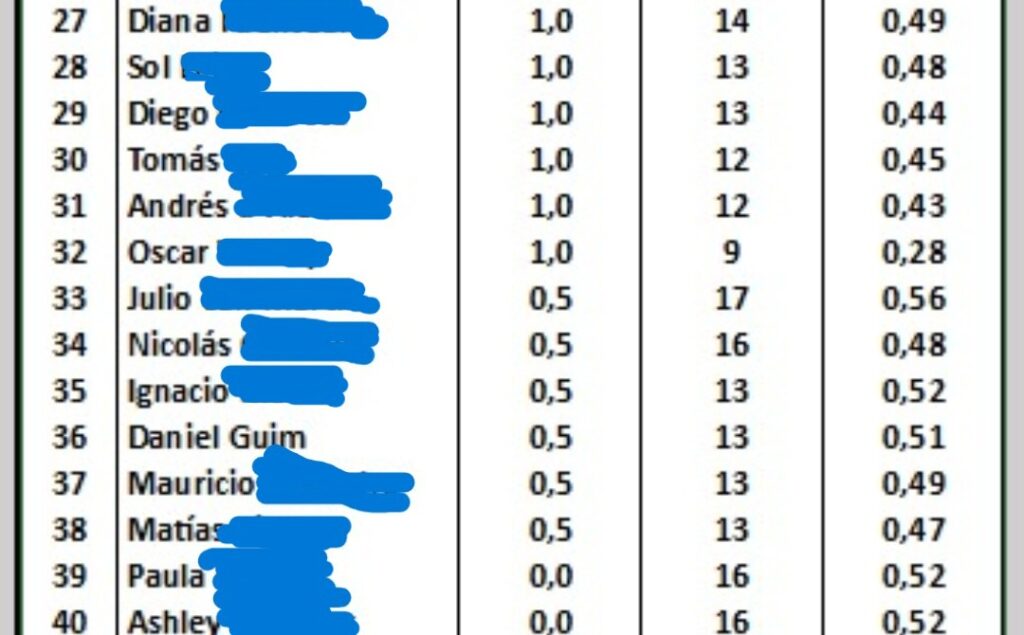
The Second Tournament
I went into the second tournament feeling more confident and prepared. It was on a Sunday at noon, so much earlier in the day. It also had 4 qualifying games before the semifinals, so everyone had a better chance to prove themselves.
In the first game the fourth player didn’t arrive, so it was just three of us. We ran out of time, and another player won with 9 points, but I was right on his tail with 8 points.
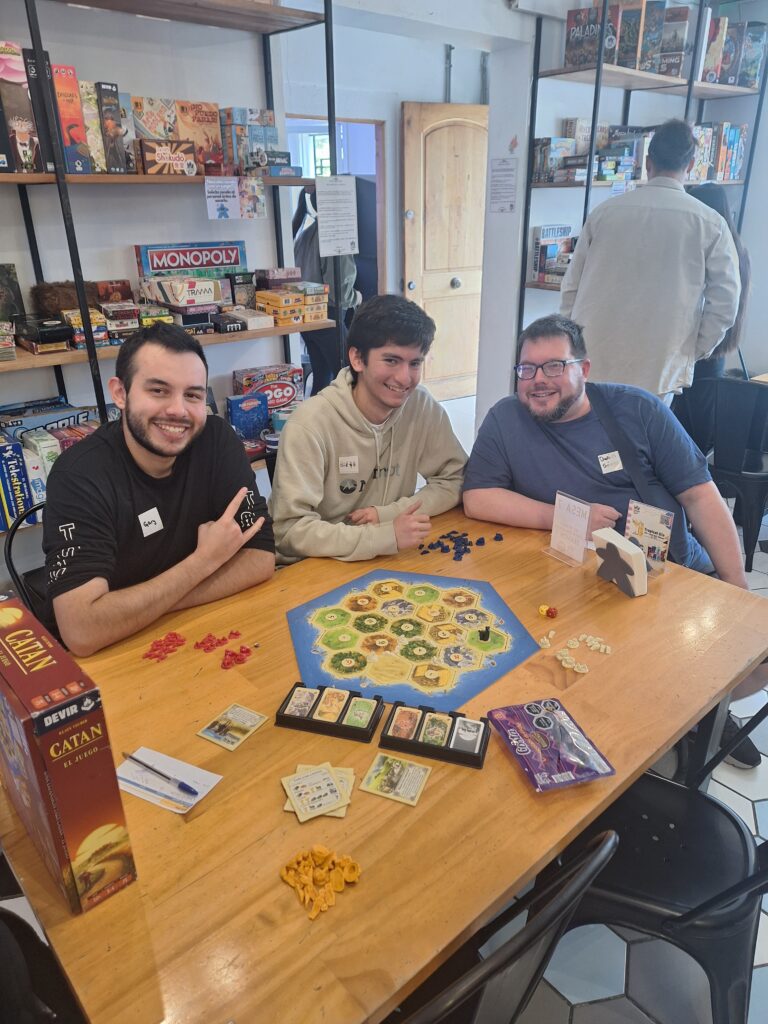
The second game was with 4 players, and I managed to pull off a win! I won the game with 10 points.
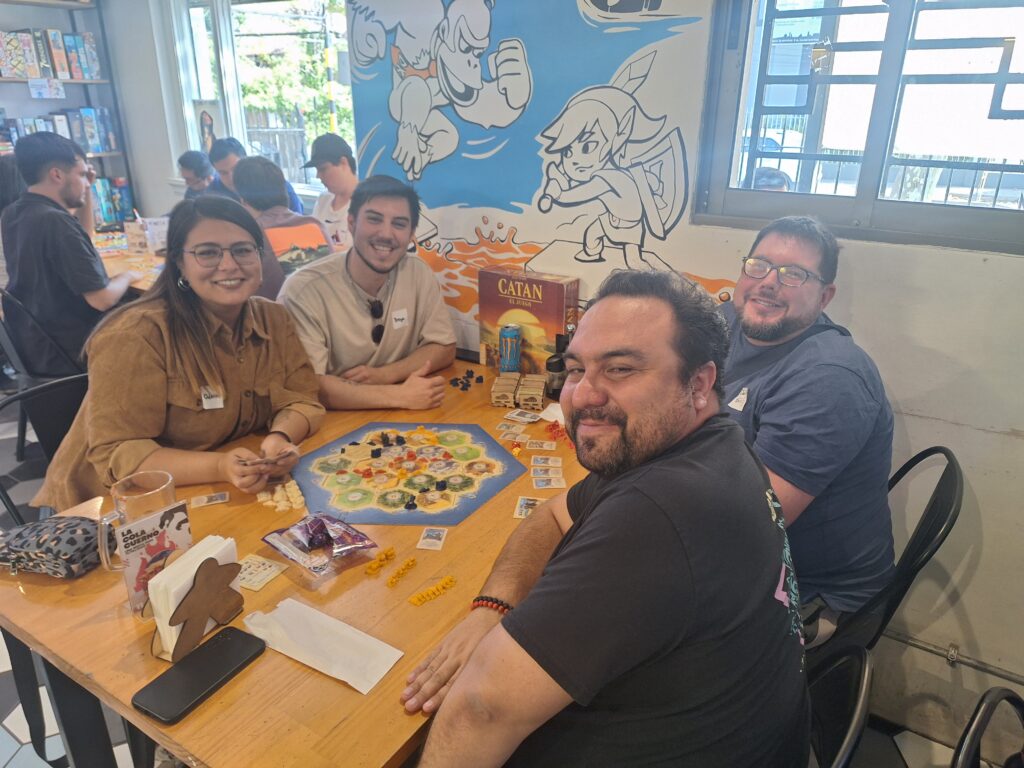
I noticed that after the first table that the lower the number table you’re at, the better you’re doing in the overall ranking. I was at table 6 for the second game, and I made it to table 3 for the third game.
I felt like the pressure was on going into the third game. It was clear to me that the players knew how to play. There were some tense moments. I was at 9 points, and I had the cards in my hand to win the game. I just needed to wait until my turn. Then another player pulled the last development card which was a victory point, giving him the win.
For the fourth game I made it all the way up to table 2. I was nervous but did my best to stay calm and focused. The players were on top of their game, and they had some moves that caught me off guard. Time ran out, and I ended up in a tie with another player for first with 8 points.
I kept my fingers crossed as they calculated the results to see who made it to the semifinals.
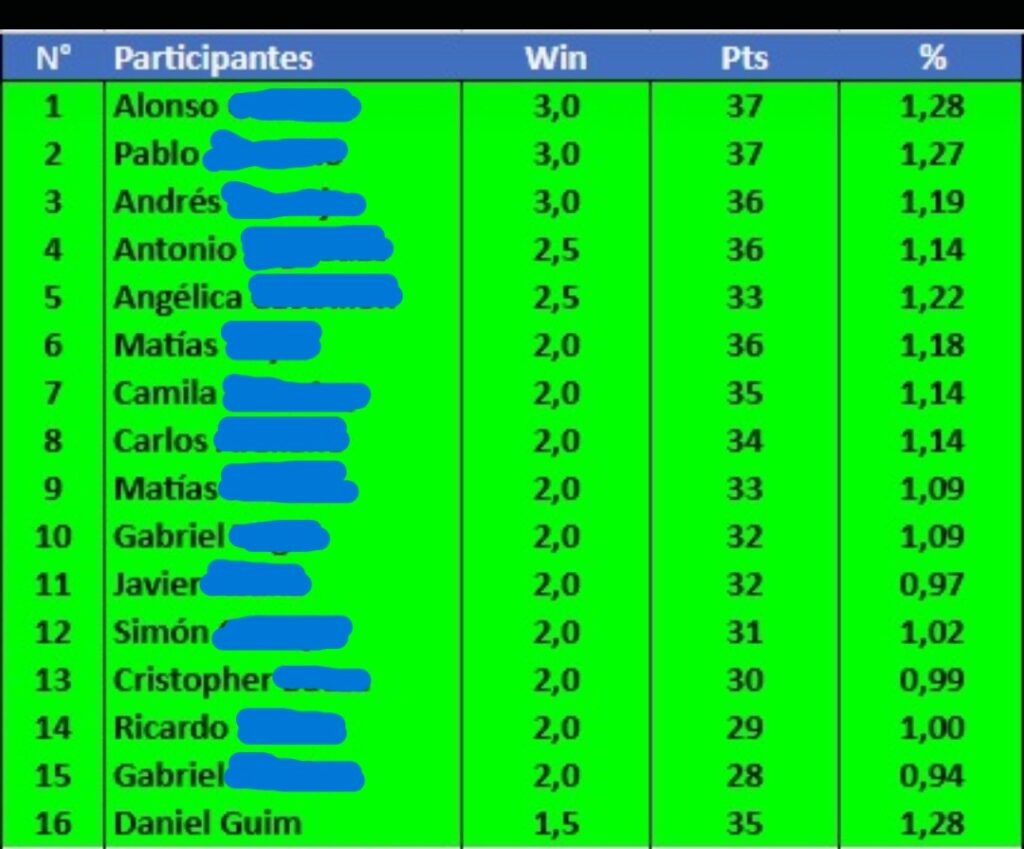
I qualified as number 16 overall out of 65 players! I was ecstatic.
We only had about 5 minutes before the semifinals started. I didn’t do that well in the game, and looking back I see a few mistakes that I made. The winner got to 10 points very easily, with everyone else only getting 4 or 5 points.
By the time I was getting ready to leave, it was already past 7:00. It was a long and intense day, but a very fulfilling one.
What did I learn?
Looking back, a lot of learning came out of these events.
I was proud of myself for putting myself out there and doing as well as I did, especially participating in the whole process in Spanish and being deaf in one ear. Despite that, I notice that my speaking and listening have slipped a bit. Living alone and teaching English online doesn’t give me many opportunities to practice Spanish unless I actively seek them out. At times people had trouble understanding me, and I noticed that I can be clearer with my pronunciation.
I also noticed the importance of being prepared. I packed a bottle of water and some snacks, and they came in handy. I made sure what I was wearing was comfortable and packed sunscreen in case my table was outside. In the end I was there for over 7 hours, so anticipating what needed to be done was a win.
The tournaments reminded me to advocate for my needs. At one point there was a player that was throwing cards to me across the table, and I found it quite rude. I calmly asked him to hand the cards to me, and he complied. There were also various times that players were on their phones, which was not only a distraction from the game but also against the rules of the tournament. When I brought it up they put their phones away and didn’t touch them the rest of the game.
I noticed that social skills were also really important. I made sure to shake hands with each player before starting, and I asked for their name. When talking to them to make trades I called them by name. I also made some jokes from time to time to alleviate the tension or show exaggerated my reaction to losing cards or a bad play against me. I believe that was part of what helped me do so well in the second tournament.
Last but not least, I learned to trust myself and believe that it’s ok to go outside of my comfort zone. These two tournaments have helped me get to know others, build my confidence, and play a game that I love. I’ve decided that the fear of failure and previous feelings of hopelessness have held me back enough over the years.
If you play Catan or have found a way to step outside your comfort zone, feel free to leave a comment below. I’d love to hear what you’ve done to build confident and move forward in life.
